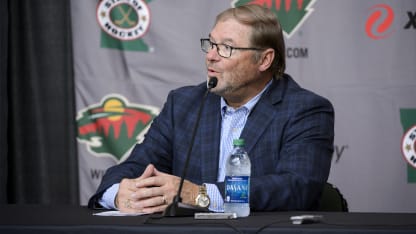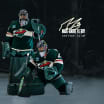Leipold: 'We're super-charged right now'
Wild owner talks about his excitement for new general manager Paul Fenton, renewed energy in organization

Dan Myers: Without getting into the specifics of who applied or who you talked to during the search, how pleased were you with the overall quality of the candidates who reached out about the GM job?
Craig Leipold: I was amazed, honestly. We spoke to a lot of people on the phone and the candidates that came in, they all spent time to understand our team and talk about our players and our strategy and thoughts they had. We got good feedback on players and our system. I know a lot more now about what other teams think about us, which I thought was outstanding, because we're incredibly well thought of around the League. Teams don't like playing us. They liked our players. So I feel good about the direction that we're going in. It was really an outstanding process and the quality of the candidates that came in were fantastic.
DM: You mentioned on Tuesday during the press conference that each person you interviewed for the job reinforced your belief that this team doesn't need to be overhauled. How reassuring was it that these candidates, including Paul, shared that belief?
CL: They all came in and, to a person, they were clear that was not a rebuild at all. We're there. We have a really good team. A couple areas, where they thought we could be stronger? They're all the same areas that we thought, in most cases. We didn't talk about specific ways or recommendations with moves -- in most cases we didn't talk about that -- because you have to understand who we are and our culture and things more. But I really like the fact that people respect us in this League. They respect the way we play, the grinders that we have. No one likes to play us, and that was really good reinforcement that we have a good team.
DM: When it comes to making some of those tweaks, does it help to have a guy like Paul who is from inside the Central Division, maybe knows the team a little bit better at the outset, and also understands the grind of the division and the Western Conference?
CL: There's no question. The candidates that we spoke to that were in the Central Division or in the Western Conference clearly know us better, they know our competition better, they know because they play us all the time, as opposed to someone from the East who only plays us twice a year. I would say there was a clear advantage in terms of their knowledge of our team and of our competition. I think it was good Paul understood that. We're in an incredibly competitive division, and we're going to have to keep working hard to keep our head above water. In many cases, many times, whoever wins this division is very likely to be in the Stanley Cup Finals. Now that didn't happen this year -- surprisingly, I will tell you -- but the two best teams in the League during the regular season] were in this division.
**DM: You've known Paul for two decades from when he first came aboard with the Predators and you owned the team. What about him has stuck in your mind and kept him at the forefront of your search for a new GM this time?**
CL: Paul is a fantastic scout identifying talent. He's really, really good at understanding players. And I'm not talking about first rounds; anybody can pick somebody in the first round. But in the third, fourth and fifth rounds, he's such a workaholic, he's been all over the world looking at these people. All of the sudden, you're in the fifth round and there are some players that are on your list that you may have had in the third round. I would say, one thing that has always stuck with me about Paul is, he can identify talent. That is a very important aspect of his job right now. I honestly think we got the best guy in the NHL right now at identifying young talent.
**DM: That was what I was going to ask you next ... his ability to find that young talent in the draft, how big of a consideration was it for you when it came time to make a decision?**
CL: Huge, just huge. And it wasn't just because he was from Nashville, where I was from; there were other assistant general managers that made our list because they've had the same successes in their organizations. That is such an important responsibility of a general manager. Their farm system, Nashville's farm system, Milwaukee is really good, they're always there. They're one of the model franchises in the AHL. Wilkes-Barre is there, with Pittsburgh, and you look at the success Pittsburgh has had. Just as someone starts moving out, they bring up a new player, and it's like, 'Where has this guy been?' Well, he's been developing in the minors. That's probably one of his big strengths is his ability to identify good players. He's also got a great relationship with college coaches, especially in the Northeast, where he's from. He can pick off some college guys that may not have been physically ready for the draft, but now they're in college and they're starting to show what they can do. He was always good about knowing where the best players were in the college ranks.
**DM: Paul credited you with the sort of family-first focus you put on the culture of the organization, both in Nashville and now in Minnesota. How important was it for you to find someone who aligned with those values -- not that they weren't here before -- but to find someone who shared those sorts of beliefs, not just at the rink but around the office?**
CL: I really do believe that a family-first mentality and, when we talk family, we're not just talking about our families: children, wives, husbands, whatever. We're talking about the family of our employees and we need to act as a family, everybody works together for each other, everybody is working hard so that we as an organization can get better and be successful. I like the idea that was in Nashville. I was at dinner last night, and Paul's wife, Nona, was with Crystal Boudreau, I was right between the two of them... and my gosh, they've got ideas about how, 'We did it this way with this team and have all the wives get together,' and really make it like we're a group working together. I really do believe that that is not just a small thing, I think it's a big thing. If the spouses of all of our players and the entire locker room, if they're friendly and they all come to games and they all bring their kids to games, it brings the team together. It brings the older players and the younger players, it just brings them all together. I know that's Paul's philosophy, and I think that will play well for us.
**DM: It's hard not to see the [parallels between the paths Bruce Boudreau and Paul took to get their first top jobs in the NHL. Do you expect those guys are going to get along just because of the shared passion of the game?
CL: I could tell last night at dinner, it was a lot of fun. They were just talking all night long about different things, about the schedule, about where they want to play, about back-to-back games, they're just talking about a million things. They're both made of the same cloth; they're just hockey guys. I really believe they have a tremendous amount of respect for each other, and I think they're gonna work really well together.
DM: When you were making calls around the League, gathering information and opinions about Paul, was there a common thread or theme that everyone seemed to share?
CL: The theme was that he's a hockey guy 24/7, that's he's a workaholic and that he will be singularly
focused on winning a Stanley Cup
. That's what he wants. When I think of Bruce Boudreau, I think of exactly the same thing, singularly focused on winning a Stanley Cup. I think they both understand and believe that we're a good team. Just making the playoffs six years in a row, that's a big deal. But they also believe that we're not good enough. So how do we get just a little bit better? And I think they're both willing to change if they have to, do whatever it takes, throw ideas out there. In talking with people, it really was, 'You're getting a guy that you never have to think about what he's doing, he's always going in one direction, and that's to get a championship,' and that's what we want.
DM: Do you feel a new energy, a new buzz around the team right now? Around the office?**
CL: It happens when you bring in any new person. But Paul is a super, premium, high-octane energy guy. You gotta keep up with him; he's going a million miles per hour, and right now, he's got so much to learn and I get the sense he just wants to jump into it. He's just dying to jump in. It is true, you make any change at this level, it will generate a new energy for an organization. But you bring in a guy who is a high-octane guy, and it's like we're super-charged right now. There's a lot of excitement. I've gotten a million texts and e-mails from people, 'Great choice, fantastic, it's about time, you got yourself a winner,' so it's all the accolades that you're hoping you would hear.


















